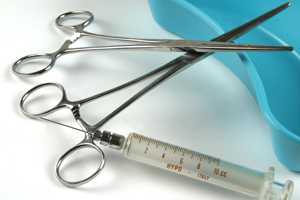Give the Gift of Life with Organ Donation
As told by Marina Monsisvais

According to the U.S. Department of Health and Human Services, about 69 percent of kidney recipients are still alive five years after their transplant.
Currently, 113,389 people are waiting for an organ. Of those, 18 will die each day waiting for an organ. However, Erica A. Rivas can count herself as one of the lucky 79 people who are given the gift of life every day.
Her journey to becoming an advocate for organ donation began in 2006 when she was diagnosed with a chronic form of kidney disease called Focal Segmental Glomerulosclerosis.
Focal Segmental Glomerulosclerosis is scar tissue that forms in parts of the kidney called glomeruli. The glomeruli serve as filters, helping rid the body of unnecessary or harmful substances, according to the U.S. Library of Medicine. Although an exact cause of the disease is unknown, many cases often lead to kidney failure.
To prevent her kidneys from failing, Rivas, an evaluation coordinator for the Office of Curriculum, Evaluation and Accreditation at the Paul L. Foster School of Medicine, was put on dialysis to extend her life by helping her body filter toxins.
But she would need a new kidney to live a normal life.
“When you’re a dialysis patient, it’s very heartbreaking,” Rivas said. “There are so many people out there who have been on dialysis for years. I spent a lot of time looking for a living donor. None of my family or friends was a match.”
Although her diagnosis seemed grim, Rivas was thrilled when she learned a selfless organ donor would give her second chance at life.
“I was on the donor waiting list, but my wait wasn’t long,” Rivas said. “Two people in El Paso are alive because one person made the decision to donate.”
Since her transplant, Rivas has made it her mission to be the voice for kidney and organ donation at the Paul L. Foster School of Medicine. Because of her experience, Rivas’ family has also registered to become donors.
“I’m thankful that someone was unselfish and decided to be an organ donor,” Rivas said. “I’m here because of him.”
Click here to learn more about organ donation or to register as a donor.
Related Stories
Celebrating Veterans: TTUHSC’s General Martin Clay’s Legacy of Service and Leadership
From his initial enlistment in the Army National Guard 36 years ago to his leadership in military and civilian health care management roles, Major General Martin Clay’s career has been shaped by adaptability, mission focus and service to others.
Texas Tech University Health Sciences Center School of Nursing Named Best Accelerated Bachelor of Science in Nursing Program in Texas
The TTUHSC School of Nursing Accelerated Bachelor of Science in Nursing (BSN) program has been ranked the No. 1 accelerated nursing program in Texas by RegisteredNursing.org.
TTUHSC Names New Regional Dean for the School of Nursing
Louise Rice, DNP, RN, has been named regional dean of the TTUHSC School of Nursing on the Amarillo campus.
Recent Stories
The John Wayne Cancer Foundation Surgical Oncology Fellowship Program at Texas Tech University Health Sciences Center Announced
TTUHSC is collaborating with the John Wayne Cancer Foundation and has established the Big Cure Endowment, which supports the university’s efforts to reduce cancer incidence and increase survivability of people in rural and underserved areas.
TTUHSC Receives $1 Million Gift from Amarillo National Bank to Expand and Enhance Pediatric Care in the Panhandle
TTUHSC School of Medicine leaders accepted a $1 million philanthropic gift from Amarillo National Bank on Tuesday (Feb. 10), marking a transformational investment in pediatric care for the Texas Panhandle.
Texas Tech University Health Sciences Center Permian Basin Announces Pediatric Residency Program Gift
TTUHSC Permian Basin, along with the Permian Strategic Partnership and the Scharbauer Foundation, Feb. 5 announced a gift that will fund a new pediatric residency.
